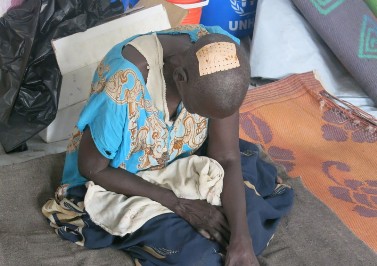S. Sudan: UN says both sides committed “crimes against humanity”
May 8, 2014 (JUBA) – United Nations Mission in South Sudan (UNMISS) said documentations and investigations into the country’s five-month-old conflict showed both sides committed gross human rights violations that amounted to “crimes against humanity”.

“UNMISS had committed [in February] to look more into investigation it had started [and] rather document better the Human Right abuses and violation of international law to be able to substantiate what was in the first report,” said Quentier.
“This report is not a surprise unfortunately. It documented grave violations on wider scale and it has been committed by both sides,” she added.
The document, entitled Conflict in South Sudan: A Human Rights Report said extrajudicial killings, sexual abuses, forced disappearance an targeted killings had characterised the conflict particularly in areas that have changed hands several times between the government and rebels.
“In light of the widespread and systematic nature of many of these attacks, and information suggesting a degree of coordination and planning in some incidents, there are reasonable grounds to believe that certain crimes against humanity may have been committed, including murder, rape and other acts of sexual violence, enforced disappearance, and imprisonment,” the UNMISS report reads in part.
South Sudan descended into conflict following differences between President Salva Kiir and sacked vice president Riek Machar over the leadership of the ruling Sudan People’s Liberation Movement (SPLM).
President Kiir – who doubles as SPLM chairman – accused Riek Machar of attempting a coup to oust him in a coup on 15 December. Machar denied this allegation, but went on to mobilise defected soldiers and armed civilians from his power base among the Nuer tribe – South Sudan’s second largest ethnic group.
Since the first few days of fighting in Juba, the fighting spread and largely remains confined to Jonglei, Unity and Upper Nile states, which all have substantial Nuer populations.
Despite notable exceptions among the leadership of both sides, much of the fighting on the group has pitted members of president Kiir’s Dinka tribe against the Nuer. Revenge attacks along the basis of ethnicity have also characterised the conflict.
Hilde F. Johnson, head of UNMISS, said both sides to the conflict should implement the report’s recommendations.
“Accountability is critical to end the legacy of impunity in South Sudan and prevent similar atrocities in the future. There can be no reconciliation without accountability. We call for a credible peace process that will lead to national healing and reconciliation,” Johnson told Radio Miraya.
The damning report is primarily based on more than 900 interviews with eye witnesses and victims. It says that “from the very outset … gross violations of international law…occurred on a massive scale”.
Johnson said that both sides had committed “grave violations and atrocities”, including the “particularly horrific” mass killing at the start of the conflict at a police station near Juba, and the killing of some 200 people allegedly by rebels in Bentiu last month.
In both instances, the killings were “clearly ethnically motivated,” Johnson said.
Over 1.3 million people have been displaced by the conflict and around half of the population urgently need food aid. The report, the UN mission head said, showed attacks took place against women, children, the elderly and disabled.
Both the government and rebel officials were not immediately available to comment.
(ST)
